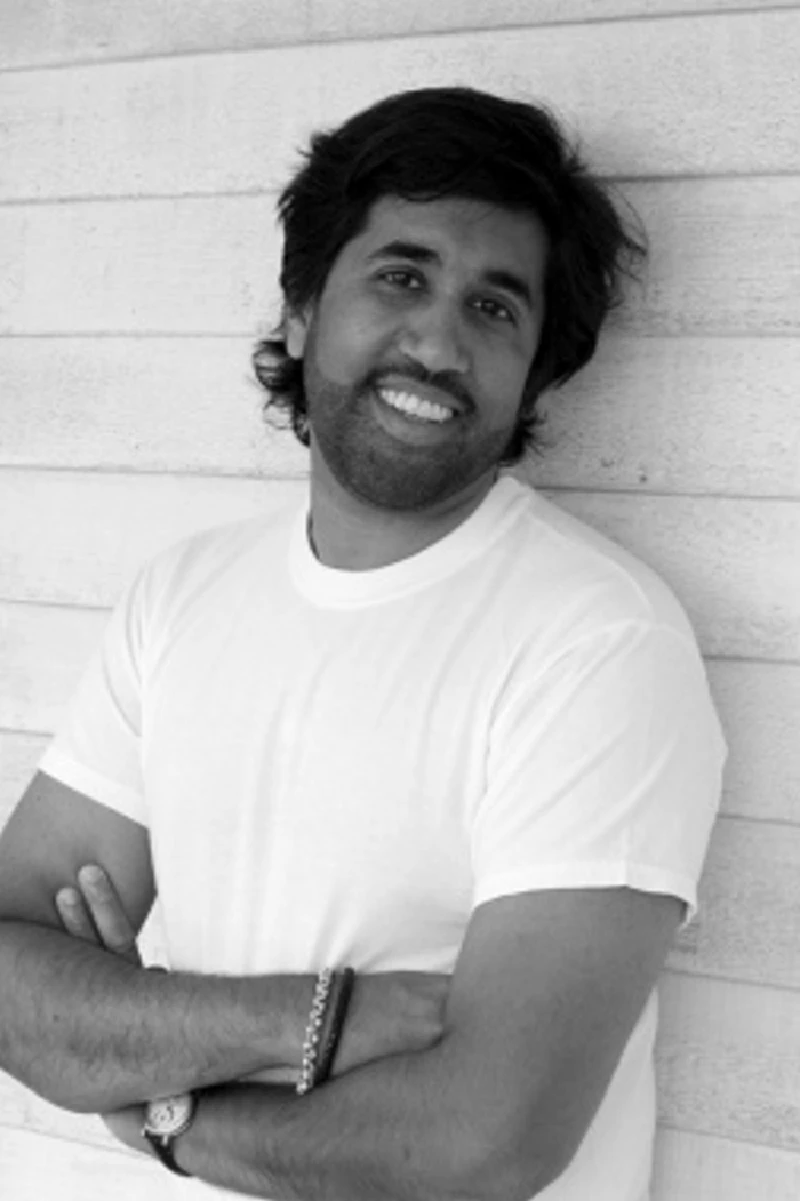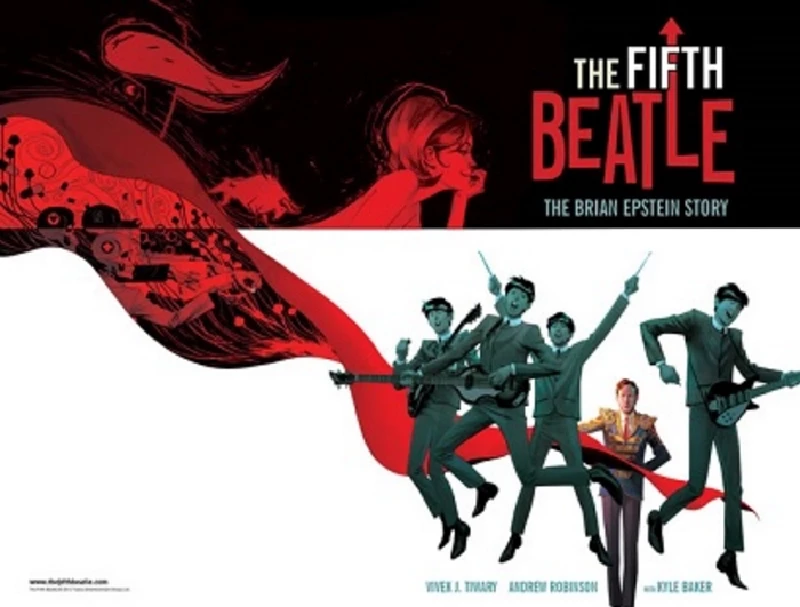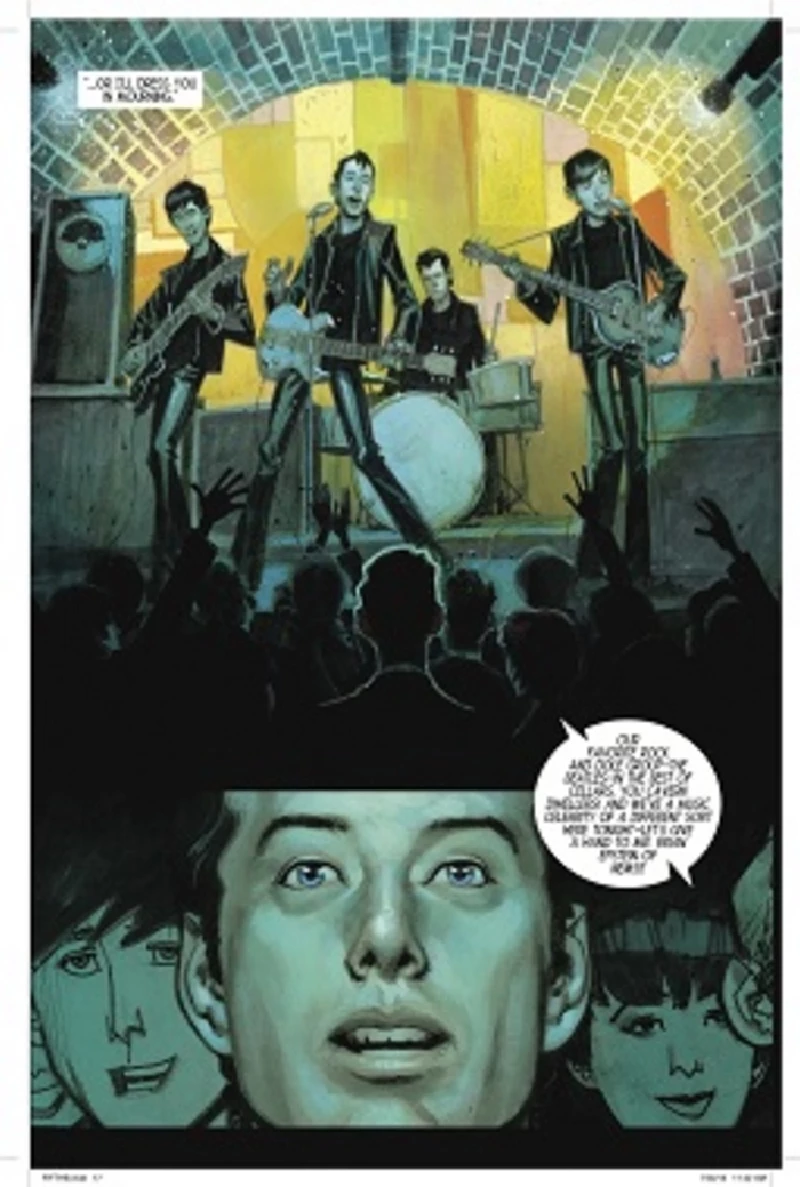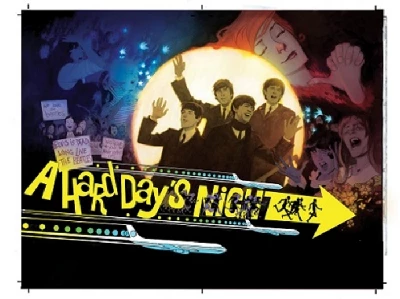Vivek Tiwary - Interview Part 1
by Lisa Torem
published: 6 / 9 / 2014

intro
In the first part of this two part interview, Vivek Tiwary talks to Lisa Torem about the writing of his graphic novel 'The Fifth Beatle', which is about Brian Epstein...
Sometimes signs are revelatory or just plain weird. Whilst composing this introduction in my head, I see a cyclist storming down the congested, sooty streets. Although his frame is crunched over the handlebars, I can spot his red and blue Superman T-shirt. Then marooned at a traffic light, I notice that the license plate ahead of me begins with the following three initials: “VJT”. Well, umm, signs do happen for a reason… Vivek J. Tiwary is a surge of electricity. When I meet him at this year’s Fest For Beatles in Chicago, he’s seated at a table not far from fanatical fans leafing furiously through boxes of buttons and vintage posters. Even though Vivek is animatedly explaining the theme of his new book to a rapt guest, he glances over to let me know that I’m next and that he’s anxious to speak with me too. He has this remarkable ability to see everything at once, to be fully present, despite the clamouring of the crowd. I attend his panel later and he offers to sign the deep black page of my collector’s copy with a thin silver Sharpie. First, smiling, he asks me to confirm the spelling of my name, for which I am grateful because not everyone bothers. His greeting includes a lyric from one of my favourite Beatles song, not surprisingly one which embraces Vivek’s optimistic attitude towards just about everything. That said, Vivek is a very accomplished individual, but he is also incredibly mindful and appreciative of his strong familial connections. To that end, he credits his parent in his dedication: “My mother, Nandini Beharry Tiwary, always taught me not only to work hard in the present—but to study the past, find inspiration wherever you can, and carve your own future.” Vivek’s CV is impressive. On Broadway, his productions, which include ‘The Addams Family’, Green Day’s ‘American Idiot’ and ‘A Raisin in the Sun’ have garnered 25 Tony Awards and 44 nominations. In interview with Pennyblackmusic, he takes us up to speed with plans to produce a brand new Broadway musical… He is a Magna Cum Laude graduate of the Wharton School of Business, has a filmmaking certificate from The New York Film Academy and studied acting at the Susan Batson/Black Nexxus Acting Studio. A much sought-after public speaker, he frequently shares his insights with comic book/graphic novel and business aficionados. He has won the coveted Eisner Award. Although his vast music-industry accomplishments include launching and heading the Alternative Marketing Department at Mercury/Polygram Records, he currently heads the Tiwary Entertainment Group (www.tiwaryent.com) in his native New York City. And for the last couple of decades, Vivek has devoted himself to deciphering and chronicling the unique and largely untold story of the unsung Beatles manager Brian Epstein. His crowning glory, ‘The Fifth Beatle: The Brian Epstein Story’, for which he travelled multiple times to Liverpool, has won multiple awards, including ‘The New York Times’ #1 best-selling graphic novel distinction. But there is much to be discovered as well about this ‘Fifth Beatle’ author. Vivek J. Tiwary explains why the Brian Epstein legacy means so much to him, how a confused city kid with a rolled up comic book in his back pocket rose to become an acclaimed literary and business success story and why balance is the buzzword we must not ignore. PB: How did you capture the Beatles’ dry wit, which was so charming, in the dialogue of ‘The Fifth Beatle’? VT: Thanks for saying that I did that. I guess it was just a lot of research and attention to that goal. I am a huge Beatles fan and I’ve certainly for pleasure seen all of the movies and looked at a ton of the footage ,and so in addition to all of the basic stuff that one would do I guess I did go the extra mile to watch more obscure things and I spent a lot of time in Liverpool. A large chunk of the script was written there for expressly that reason, to be writing, to be soaking up the environment while actually constructing the words. PB: And picking up the wonderful rhythm of the Liverpool dialect. VT: And Liverpool is still very much like that, or at least parts of Liverpool. The folks who are there still have sort of that Liverpool wit and sarcasm. So, it was really just a matter of caring to do that and spending time. Even though I couldn’t spend time with the teenage Beatles, I could spend time with people from Liverpool who might have approximated that. PB: In terms of your research, which was very extensive, did you experience any roadblocks along the way? VT: I wouldn’t necessarily say that I experienced roadblocks - and this is going to sound very inspirational speech giving - but I don’t personally believe in roadblocks. I guess I’m fortunate enough to work on projects that I love so when you’re coming from that place. To me, anything that someone else might consider a roadblock just feels like a challenge, and more often than not, like a fun challenge. The kind of things that might be considered roadblocks are certain people being suspicious of me or my motives or certain people not wanting to talk to me, and facts or details being difficult to research. In all of those cases, those seem like fun things to work on. If somebody is suspicious of my motives, I think if you spend a little time with me or listen to me talk you’ll realise that my heart is in the right place and this is a labour of love for me. I love talking about this so I look forward to making sure that that person knows how genuine I am. If there is some fact that is problematic in uncovering the truth behind, well, that’s kind of cool. That’s what the whole process is about, right? It’s like uncovering those untold stories. I suppose one could think of that as frustrating. but, to me, unravelling the mystery is half the fun. I definitely wouldn’t say that it was easy. It was incredibly difficult in large part because when I began this there weren’t these online resources we’re used to today. So, I didn’t really have a choice except to do interviews. That’s a time consuming and difficult-to-arrange process. So. it was definitely more often than not it wasn’t easy but I don’t know if there were anything I would consider a roadblock. PB: More like forks in the road that led to other discoveries. VT: Yeah. PB: So, at what point did you find yourself really relating to Brian’s story rather than thinking of him as a business icon? VT: It was pretty much as soon as I learned about his personal story. It doesn’t take long to get at least the very basics that he was gay, that he was Jewish, that he was from Liverpool, that he ran around saying he found a local band that were going to be bigger than Elvis. To me, that right there - he was an outsider with a big dream and that’s how I felt when I discovered the story. When I discovered the Brian Epstein story I was a student at the Wharton School of Business where people were pursuing much more traditional business-oriented pursuits like finance, accounting, those sorts of fields. I know my parents wanted me to be on track to become an actuary. That’s very funny because to this day I still don’t fully understand what that is (Laughs). I understand an actuary is some kind of super accountant, but I don’t know exactly what they do. So, at the time even when I discovered the basic details of Brian’s story, I felt that I could relate to that. Not to the degree of obstacles - certainly I’ll never be able to understand what it’s like to be gay at a time when it’s against the law, to be told your form of love is illegal. I think it would be rude of me to suggest that I could ever understand that, but the emotional beats were things I could connect to and that came to me pretty quickly, pretty immediately. PB: Andrew C. Robinson’s illustrations are so transformative. They start out being muted and murky when Brian frequents the docks of Liverpool and get more and more detailed, majestic and Renaissance like as the story unfolds. How did you coordinate the illustrations with the text? Did you generally agree on style? VT: It was a very, very collaborative process. The script that I had was very specific in how I wanted to treat the story. Andrew is an incredibly talented artist and so he had a lot of ideas, but I did approach it to the extent of saying, “Here’s photo reference, here’s wardrobe reference, here’s pictures of what Liverpool looked like, here’s the tone of the scene, here’s the lighting I’m looking for.” When I first envisioned the story I thought in terms of colour palette. I thought, it starts off in Liverpool, 1961, which was rainy, grey, industrial, drab, depressed. I saw it in very muted tones: black, white, grey, blue and it ends in 1967 London, which is the summer of love and the birth of the psychedelic era and there’s literally an event that year called a Technicolor dream. So, I saw the ending of the book being full-on bright Technicolor - so even from our earliest conversations I talked about that. I wanted the first few pages to be black, white, blue and grey and no other colours. And then when the band shows up for the first time I wanted us to have our first bursts of yellow, orange and red and those colours. And then if you look at the pre Cavern and the post Cavern pages you’ll see it is blue, grey, black, white, and there’s a little bit of red and slowly there’s more of that. Then we get to the Kyle Baker pages in the Philippines, which are totally bright colours. So, that was all very specific ideas that I had. That being said, Andrew is one of the best artists in the business. He won the Reuben Award this year, which is the highest award a cartoonist can win. So Andrew’s not an automaton. Anytime I had ideas, he usually countered with some other idea that was additive. We’ve never had a situation where we clashed but there were a number of situations where he said, “That’s great but how about we also do this,” and in every single case his ideas were genius. So. it really was collaboration and there never was a moment where we argued about something. But I always came into that collaboration with knowing what I roughly wanted. PB: ‘The Fifth Beatle’ has quite a few dramatic and poignant scenes. In one panel, Cynthia Lennon shows Brian new baby Julian and asks him to be the godfather and he’s very touched. And, yet, ironically, here’s a man who would never enjoy the rewards of a real commitment or a family life. Billy J. Kramer, one of Brian’s other clients, commented on how well Brian took care of those around him. He really was a mentor and/or father figure to many. In the final panel, Cynthia is shown standing there alone, holding Julian. Was that intentional? VT: Absolutely. I think that part of that scene is like much of the Brian Epstein story. If I’ve done my job correctly, I want that scene to be both touching, uplifting but also a little heartbreaking. First of all, it’s sad that Brian will not have children of his own because forget about gay marriage, being gay was illegal; the idea of two men ever having a child was complete fantasy in those days. So, I think it’s safe to say that Brian never imagined a time when he would have a child so that’s sad right off the bat, but it’s rather beautiful that he gets to vicariously be a father and be a godfather to Julian. It’s beautiful because Brian cares so much for John so to be a godfather to John’s child is a really beautiful thing, but it’s also sort of tragic because the same thing that brought him Julian, John and the Beatles is the same thing that pulls him away from enjoying that experience because he’s so busy. What happens in that scene is he gets pulled away He has to go back to tour. He has to deal with business. So, he doesn’t get to be the present father, in this case godfather, that many dads want to be. I’m a father and I know this well. I’m going to Orlando tomorrow and I’m leaving straight for Baltimore and that sucks. Let me take that back! I’m very honoured that I’m doing these things, but I miss my family and my son starts school on Monday and I probably ought to spend the entire day at the conference on Sunday but I’m not going to – I have a panel from one to two and I’m leaving right afterwards. I’m going to hop on the first train so I can get home and spend some time with my son and put him to sleep and take him to his first day of school the next day because that’s important. But it’s hard and it is this bizarre duality because I am blessed to be so busy. I’m really lucky in that sense. My projects are successful, but it also presents a challenge and that’s what Brian faced too. He was blessed and lucky that the Beatles were so successful and that his professional dreams were coming true, but they made it harder and harder to pursue the personal side of his life. PB: There’s another scene in which Brian is meeting with Elvis Presley’s manager, Colonel Parker. Brian goes into the meeting with his best intentions, a meeting of the minds between two managers. But the outcome is horrific. VT: It is a critical scene in understanding part of the Brian Epstein story. It was a fun scene to write, and I’m proud to say that a lot of people have said it’s one of their favourite scenes in the book. Parker, to me, was a guy who was very vampiric, but let’s start by giving him credit. He made Elvis. Elvis was a poor boy from Tennessee and didn’t have a business background and didn’t have marketing skills. Parker really helped to turn him into the huge star he was, but like a vampire Parker also sucked the lifeblood out of him so Andrew and I thought, “If he’s going to be vampiric, let’s make him vampiric.” As the scene goes on, he gets more and more visually devilish – we’re seeing it through Brian’s eyes so he becomes more pointed teeth and fiery eyes. So, right off the bat, it was fun to construct the scene. We’ll never know exactly what was discussed or spoken that day because the only two people that were there have left us – Brian and Parker are no longer alive - but it is a matter of record that my research uncovered that Brian went into that meeting very much hoping that Parker would become a friend. As he says in the sequence, he always thought the Beatles were going to be “bigger than Elvis” and so meeting Parker was in some ways a dream come true for him, and he thought that, as the Beatles and Elvis were the two biggest acts on the planet, Parker might have good advice for him – advice on some of the things we were just talking about in the Julian sequence, advice about how to juggle all of the madness of the business but also make time for your personal life. He thought Parker could be both a true business friend and personal friend. And so he went in there with really high hopes, and it is also a matter of record that I’ve heard from his friends that he came out of that meeting saying it was awful, it was disillusioning. Parker was terrible. He was crude. He didn’t care much for Elvis. He had the exact opposite morals to Brian, so that part is true and on top of that, at the risk of selling myself short as a writer or revealing how little I actually had to do with it, I would say that 60-80 percent of the words that are in that scene are things that Parker actually said. As a writer I can tell you that you just can’t make that stuff up – “Elvis is an attraction not an artist. Elvis takes 50 percent of everything I earn. You’ve got to watch out for Los Angeles and L.A. Too many damn Jews and Jews will take advantage of you. The kind of assistant I like is a male, soft-spoken and preferably a homo because they’re easy to control and there are no marriage problems.” All of those things, those are Parker quotes. Those are things he said either on the record in interviews or things he told other people. He said that Jewish thing to someone who is Jewish fully knowing that they were Jewish and just being mean. So, all of those things were things he actually said so I felt pretty comfortable putting those things in there, even though who knows exactly what was said? PB: You have threaded the image of Brian as a matador throughout the story VT: The application of the matador image is my own creation as author. One of the joys of writing a graphic novel is that it allows you to have creative leaps of fantasy. It’s part of the medium. It’s not a strict biography. So, the fact that Brian has a matador vision during when he first sees the band at the Cavern Club; that he has an ongoing matador vision throughout the course of the book and all the way up until his death, that’s all my creation. It is, however, based on reality in the sense that Brian was a huge fan of bullfighting. He loved its theatricality. Much of the sentiment that’s in the scene with John and Brian on the beach where Brian explains why he likes bullfighting – the fact that, yes, the matador’s handsome but it’s really not about that. It’s that he uplifts the arena; he gives the bull glory, but shows its danger. He uplifts the nation. Most matadors were poor and then they raised themselves up to the stature of matador. Those are the things that he finds beautiful and inspiring. All of those sentiments are things that Brian felt, and that was something that I spent a lot of research doing and talking to his friends about. Brian was a guy who dedicated his life to helping this band share a great message of love with the world, and that’s really beautiful. Growing up in New York City, I didn’t grow up with bullfights. If you grew up in Madrid I think bullfighting would be something you’d understand, but as a New Yorker we had the Yankees, I didn’t get that. And to top it off I’m a vegetarian and an animal lover. So, I had a very hard time personally reconciling this guy who dedicated himself to spreading a message of love around the world. How could a guy like that adore the sport of bullfighting? It didn’t make any sense to me. So, I did a ton of research to figure that out and what I figured out was that for him it was the beauty, the theatricality And I don’t think it’s a coincidence that the bullfight is also a dance with death. And it’s melodramatic to go so far to say that his career was a dance with death, but the more and more successful he became in managing the Beatles and his other acts the greater risk he had of having his personal life come to public light, which would have gotten him thrown in jail. So, in many ways he did choose a career that was like a dance with death. I think on multiple, beautiful levels that it isn’t just a random thing that Brian loved bullfighting. It ties very deeply into his psychology and into his relationship with the band. So, even though I may have made up that metaphor and made up those visions, I feel that they are based on real feelings and sentiment and possibly something that did flow through Brian’s life. PB: You used that chilling matador quote - “As a bullfighter, you’re completely alone.” VT: When I read that quote, which is Juan Belmonte, talking about bullfighting, I thought, “That’s how Brian felt about the Beatles”. It could not be more crystal clear. That’s what it was like for him. As a bullfighter you’re completely alone. Even if thousands of people are watching your fight, it is an unimaginable loneliness. The only thing you could sense at that moment is the bull. And for people who like bullfighting that is a very revealing and somewhat surprising thing to say because the bullfighters are never alone. They’re adored. They’re national heroes. It’s not just like some popular Yankee player of the day. These guys are the Babe Ruths. They transcend their sport and become national icons. So, to imagine that somebody, who thousands of people are watching as they fight, are actually feeling alone -- That’s exactly Brian Epstein. There were millions of people watching the Beatles, watching his accomplishments and yet feeling alone.
Picture Gallery:-


interviews |
|
Interview Part 2 (2014) |

|
| ...while in its second part he talks about its forthcoming film adaptation and his plans for the future |
most viewed articles
current edition
Spear Of Destiny - InterviewRobert Forster - Interview
Fiona Hutchings - Interview
When Rivers Meet - Waterfront, Norwich, 29/5/2025
Carl Ewens - David Bowie 1964 to 1982 On Track: Every Album, Every Song
Brian Wilson - Ten Songs That Made Me Love...
Pistol Daisys - Waterfront, Norwich, 29/5/2025
Badly Drawn Boy - Aviva Studios, Manchester, 18/4/2025
Nils Petter Molvaer - El Molino, Barcelona, 24/4/2025
Skunk Anansie - Old Market, Brighton, 16/5/2025
previous editions
Heavenly - P.U.N.K. Girl EPOasis - Oasis, Earl's Court, London, 1995
Boomtown Rats - Ten Songs That Made Me Love....
Dwina Gibb - Interview
Trudie Myerscough-Harris - Interview
Sound - Interview with Bi Marshall Part 1
Serge Gainsbourg - Ten Songs That Made Me Love...
Susie Hug - Interview
Brad Elvis - Interview
Chuck Prophet - Ten Songs That Made Me Love...
most viewed reviews
current edition
Peter Doolan - I Am a Tree Rooted to the Spot and a Snake Moves Around Me,in a CircleGarbage - Let All That We Imagine Be The Light
John McKay - Sixes and #Sevens
Suzanne Vega - Flying With Angels
Little Simz - Lotus
Vinny Peculiar - Things Too Long Left Unsaid
Billy Nomates - Metalhorse
Eddie Chacon - Lay Low
Only Child - Holy Ghosts
Vultures - Liz Kershaw Session 16.06.88
Pennyblackmusic Regular Contributors
Adrian Janes
Amanda J. Window
Andrew Twambley
Anthony Dhanendran
Benjamin Howarth
Cila Warncke
Daniel Cressey
Darren Aston
Dastardly
Dave Goodwin
Denzil Watson
Dominic B. Simpson
Eoghan Lyng
Fiona Hutchings
Harry Sherriff
Helen Tipping
Jamie Rowland
John Clarkson
Julie Cruickshank
Kimberly Bright
Lisa Torem
Maarten Schiethart